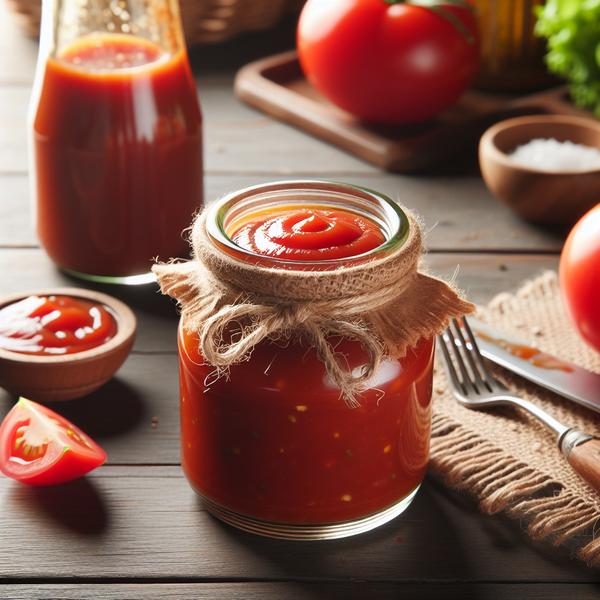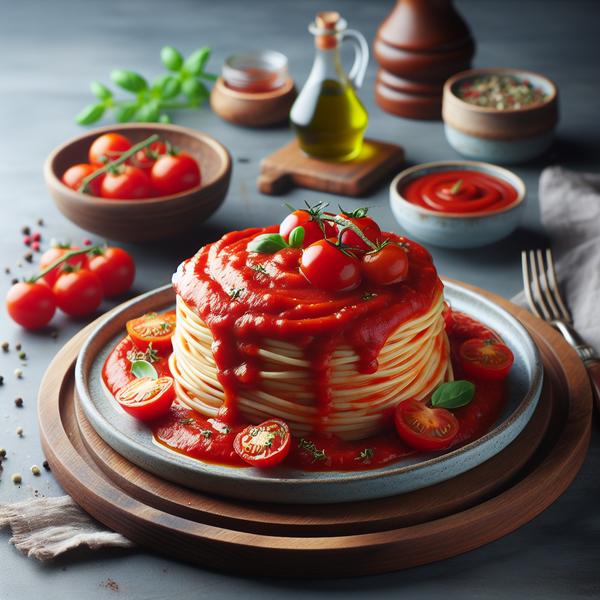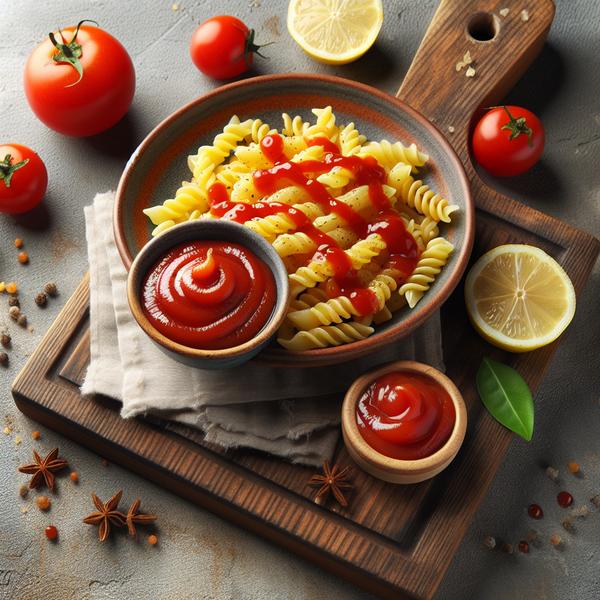Ketchup vs Tomato Sauce: Everything You Need to Know

Curious about the age-old debate between ketchup and tomato sauce?
Wondering which condiment aligns with your flavor preferences?
Hold on tight, buckle up, and get ready to dive deep into the saucy world of these tomato-based delights. 🔍
Let's unravel the mysteries together.
Understanding the Ingredients: Tomato Sauce vs Ketchup

Tomato sauce and ketchup may seem alike, but they're actually quite different.
Let me break it down for you:
- Ingredients: Tomato sauce is made with fresh ingredients like tomatoes, garlic, onions, herbs, and spices. It's packed with flavor and richness. On the flip side, ketchup is a quick mix of tomatoes cooked with vinegar, sugar, salt, and seasonings.
- Texture: When it comes to texture, tomato sauce can have some chunks of vegetables, giving it a hearty feel. But ketchup always keeps it smooth and silky.
- Origins: Now, here's where things get interesting. The word "ketchup" has its roots in Chinese, from 'koechiap', which means 'brine of fish' or 'spicy sauce'. On the other hand, "sauce" comes from Latin and means 'salted'. Tomato sauce had diverse origins across cultures long before ketchup popped up in Asia, inspired by fermented fish and soy sauces.
So as you see, knowing these differences will expand your culinary knowledge and make you appreciate the distinct flavors and uses of tomato sauce and ketchup.
Now that you understand the differences between tomato sauce and ketchup, let me share a fascinating tidbit with you.
Have you ever wondered about the characteristics of San Marzano Tomatoes and their reputation in the culinary world? I've written a helpful guide that dives into this topic, perfect for those curious and inquisitive like yourself.
Taste Differences: Tomato Sauce vs Ketchup
Tomato sauce and ketchup taste different.
You see, tomato sauce is like a flavor explosion in your mouth.
It's got layers of richness thanks to herbs like oregano and basil. It adds this complex and aromatic vibe to the dishes you whip up in the kitchen.
Ketchup, on the other hand, is a bit sweeter.
That sweetness comes from added sugar.
But what sets it apart are the spices like cinnamon and nutmeg that give it a tanginess that's totally unique. It goes well with so many different foods.
Consistency is another thing.
Tomato sauce has a thinner texture, making it perfect for cooking and coating pasta or being your go-to pizza topping.
Slathering some ketchup on a sandwich or using it as a dip?
Well, it's smoother and thicker, which makes it an ideal choice.

Let's talk colors now.
Ketchup rocks its classic red tone from the tomatoes used.
Tomato sauces, though, can vary in color depending on the ingredients.
Pesto sauce may have a hint of green, while mustard-based sauces could be sporting a sunny yellow look.
Finally, tomato sauces go all out with their flavors.
They can be sweet, savory, spicy- or sometimes even a mesmerizing combo of all three.
On the other hand, ketchup usually stays consistent no matter where you go.
Now that you've got the lowdown on the taste differences between tomato sauce and ketchup, you can confidently pick the best one to jazz up your meal. 😋
Just a little heads-up: If you're curious to discover more about the versatile ingredient known as sambal oelek and how it can tantalize your taste buds, check out my article on Sambal Oelek Definition. You won't want to miss out on the flavorful possibilities it brings to your culinary adventures.
Well, now that you know the taste differences between tomato sauce and ketchup, let me delve deeper into their versatile uses and how they can take your culinary adventures to new heights!
Cooking Uses: Tomato Sauce vs Ketchup
Tomato sauce: a versatile base for various dishes
When you're cooking up a storm in the kitchen, tomato sauce is your best friend. Its thick consistency and delicious flavor make it perfect for a wide range of dishes.
Whether you're making pasta sauces, soups, stews, or even pizza, tomato sauce adds that amazing touch you need.
But here's the best part:
You can even use tomato sauce as a substitute for tomatoes in recipes like lasagna, tacos, and burgers.
It gives them that rich tomato flavor without any of the chopping or mess.
And if you're feeling extra adventurous, try using tomato sauce as a dip for fries or fried foods. Seriously, the possibilities are endless!
Ketchup: the condiment superstar
Now, let me tell you about ketchup, it's a whole different story.
Originally invented for multiple purposes like cooking, tenderizing meat, and enhancing flavors, ketchup has become most famous as a condiment for burgers, fries, and hot dogs. You know the tangy and sweet combination we all love so much?
That's ketchup.
But here's the thing:
Ketchup is not as versatile as tomato sauce. It goes through a standardized production process to maintain its consistent taste and quality.
Unlike tomato sauce, which can vary in viscosity depending on how you use it (like as a dressing or marinade), ketchup stays the same every time.
So next time you're cooking up a storm, keep in mind that tomato sauce is the hero in the kitchen, while ketchup reigns supreme on your plate.
Cooking vs Condiments: The battle of versatility
Tomato sauce unquestionably dominates in the realm of cooking.
Its thickness and robust flavor make it an incredibly versatile base for many dishes.

From pastas to soups to pizzas, tomato sauce can do it all.
On the other hand, ketchup is primarily known as a condiment for burgers, fries, and hot dogs.
Yeah, sure it was originally invented for cooking, but it has now become a superstar in the world of condiments. But here's the thing:
Tomato sauce can be used as a substitute for tomatoes in dishes like lasagna, tacos, and burgers.
It adds that amazing tomato flavor without any of the extra work.
And get this, you can even use tomato sauce as a dip for fries or fried foods.
Talk about versatility!
Homemade sauces give you the freedom to experiment and get creative in the kitchen.
You can play around with their viscosity depending on how you plan to use them - whether it's for cooking or dressing. This adds a whole new level of excitement to your culinary adventures.
Ketchup, on the other hand, goes through a standardized production process to maintain its consistent taste and quality.
So, if you're looking for more variety and opportunities to try new things, tomato sauce is your go-to. But hey, if you want that classic tangy and sweet flavor we all adore, ketchup will always save the day. The choice is yours!
But here's something you may not have considered - the health benefits of choosing tomato sauce over ketchup...
Health Considerations: Tomato Sauce vs Ketchup
| Tomato Sauce | Ketchup | |
|---|---|---|
| Origin | Made from cooked tomatoes, often with added herbs and spices | Originally a fermented fish sauce, now made with tomatoes, vinegar, sweeteners, and spices |
| Texture | Typically smooth and thick with occasional tomato chunks | Smooth and slightly runny |
| Taste | Savory and tangy, with a balance of sweetness and acidity | Sweet and tangy, with a stronger emphasis on sweetness |
| Uses | Versatile and used in a wide range of dishes including pasta, pizza, and soups | Primarily used as a condiment for fast food, burgers, and hot dogs |
| Nutrition | Contains natural vitamins, minerals, and antioxidants from tomatoes. Lower in sugar and may be lower in sodium depending on the brand or homemade recipe | Higher in sugar, sodium, and additives due to the sweeteners and preservatives used in commercial production |
| Health Benefits | Provides a good source of dietary lycopene, which is beneficial for heart health and may reduce the risk of certain types of cancer | Contains less beneficial nutrients and may contribute to increased sugar intake if consumed excessively |
| Homemade Option | Can be easily made at home using fresh ingredients with control over sugar and additives | Homemade ketchup recipes are also available, but may require additional time and effort to achieve desired taste and consistency |
| Availability | Widely available in various brands and flavor options at grocery stores | Available in most grocery stores, often with a wide range of brand choices and flavor variations |
| Price | Generally more affordable compared to branded ketchup | Prices may vary depending on brand and quality |
| Shelf Life | Typically longer shelf life compared to homemade ketchup due to commercial preservation methods | Has a shorter shelf life compared to store-bought tomato sauces |
Tomato sauce triumphs over ketchup in terms of health.
I'm talking about tomato sauce. You know what I mean.
Tomato sauce simply has fewer additives and preservatives than store-bought ketchup.
Listen up, because this is important...
Store-bought ketchup often contains preservatives to make it last longer on the shelf.
But homemade tomato sauce?
None of that nonsense.
It's made with fresh, natural ingredients, no added sugar or unnecessary chemicals.

And let me be clear, this is a game-changer if you're trying to cut back on sugar.
So forget about that ketchup and choose the healthier option:
Tomato sauce.
By making it at home, you'll do your body a favor.
Say goodbye to unnecessary additives and say hello to flavorful, homemade tomato sauce!
Take charge of your condiments.
It's time for you to be in control.🍅
But what if you're a die-hard ketchup lover?
Don't worry, I have a solution for you too!
Making the Right Choice: Tomato Sauce vs Ketchup
Making your own condiments gives you more control and customization options.
Homemade tomato sauce is a delicious alternative to storebought ketchup, giving you the power to reduce unnecessary sugars and preservatives in your diet.
Ketchup reigns as a key player in American fast-food culture but also plays an essential role in cuisines worldwide.
If you prefer flavor with fewer additives, homemade tomato sauce is the way to go and enables you to add personal touches that suit your taste buds.
Don't settle for standard when you can create extraordinary by making your own tomato-based condiment.
The Ultimate Sauce Showdown: Making Your Decision
Key Takeaways about the Difference between Tomato Sauce and Ketchup:
- Tomato sauce is made by slow-cooking fresh ingredients, while ketchup is quickly cooked and mixed with vinegar, sugar, salt, and seasonings.
- Tomato sauce can have chunks of vegetables, while ketchup always has a smooth texture.
- The word ketchup comes from the Chinese 'koechiap', meaning 'brine of fish' or 'spicy sauce', while sauce originates from the Latin word salsas, meaning 'salted'.
- Tomato sauce has a thinner consistency and savory flavor, while ketchup is sweeter because of added sugar and has flavors from spices like cinnamon and nutmeg.
- Ketchup is smooth and ideal for dipping or spreading, while tomato sauces can range from thin and watery to thick and chunky.
- Ketchup is primarily known as a condiment for burgers, fries, and hot dogs, while tomato sauce can be used as a substitute for tomatoes in various dishes and as a base for pizza sauces.
- Tomato sauce has less sugar than ketchup and is often free from preservatives.
- Ketchup has a standardized production process, while sauces allow for greater creativity and experimentation.
- Ketchup plays a significant role in American fast-food culture, while sauces have important roles in cuisines worldwide.
And that's all for today folks.
Looking for more of my helpful articles? These ones are worth a read: What Are Collard Greens, What Is Masa Harina, What Is Mutton, Explaining Ricotta Cheese, and What Is Sushi Grade Fish
Until next time,
-Bianca Rossi